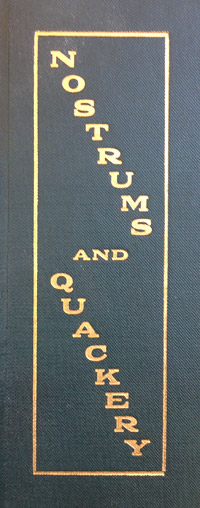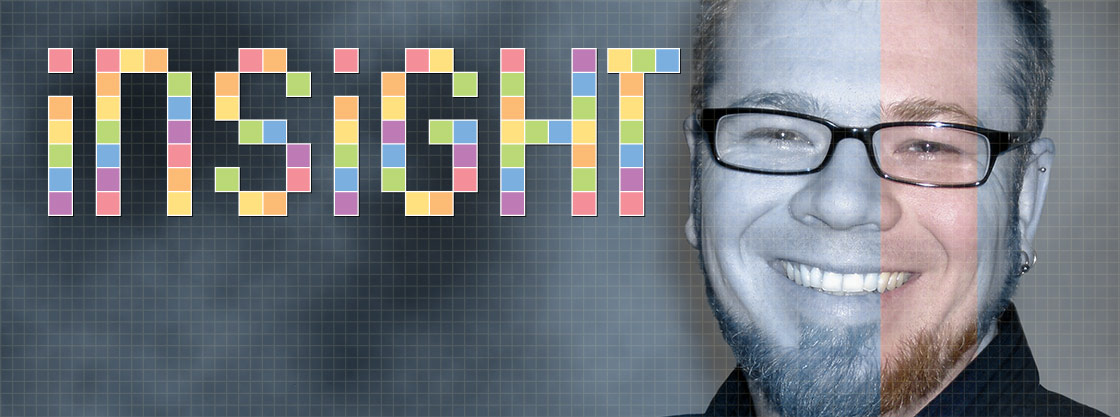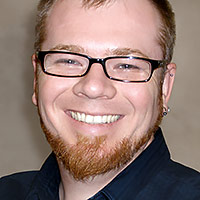
A detail from the cover of the second edition of Nostrums and Quackery (1912), from the American Medical Association. Browse the first edition online at Archive.org.
“The American Medical Association is finally taking a stand on quacks like Dr. Oz,” announced a post yesterday by Julia Belluz. A health writer at Vox, Belluz has emerged as a sharp critic of popular medical talk show personality Dr. Mehmet Oz with posts such as this, this, and this. (I recommend her thoughtful reflection on the ethics, challenges, and public health concerns of countering medical misinformers, titled “How should journalists cover quacks like Dr. Oz or the Food Babe?” Generations of skeptical critics of quackery have asked those same troubling questions.)
Belluz cites an activist medical student named Benjamin Mazer, who reports on the outcome of a policy proposal recently brought before the American Medical Association’s (AMA) House of Delegates:
The delegates, who represent doctors throughout the country, voted to support the policy proposal as we wrote it. The AMA will now be taking the lead in crafting ethical and professional guidelines for physicians who wish to disseminate medical information in the media. The AMA will also write a report describing how physicians may be subject to discipline for violating medical ethics in the media. And finally, the AMA will be releasing a public statement reiterating our professional values and condemning doctors who use the media unethically. … Many of the leading experts in medical ethics are a part of the AMA. They will now go to work clarifying the nuances of “mass medicine” and will provide recommendations. No longer will quacks be able to benefit from a lack of specific standards and professional codes.
This anticipated statement and guidelines could be useful tools (and an important symbolic victory) for science-based medicine—and a very visible black eye for proponents of quackery. If so, the American Medical Association will be reviving a tradition that goes right to the roots of the venerable organization. (It is a tradition, INSIGHT blogger Jim Lippard points out below, that led to a serious legal defeats for the AMA in 1987 and 1990 in the case of Wilk v. AMA.)
“Some misguided fakers have at times thought that they owned the press…”
In recent decades, the marketing concept of “complementary and alternative medicine” has gained tremendous traction, putting medical advocates and watchdogs in difficult positions. Should family doctors attempt to debunk patients’ unfounded but largely “harmless” pseudoscientific beliefs if doing so may drive those patients away from qualified medical attention? What are regulators to do when legislators wall off dubious supplements from their purview? From the halls of government to social media to daytime talk shows, our culture is simply saturated in pseudo-medical nonsense. It’s not surprising that the medical mainstream has long tended to leave the battle against quackery to scientific skepticism‘s specialized media and specialized critics—including, in the most recent period, skeptical bloggers. It’s easier, it’s simpler, and most doctors are too busy practicing medicine to bother becoming specialists in snake oil.
It was not always this way. Around 1911, the American Medical Association Press unleashed a punishing broadside barrage against medical fraud with their book Nostrums and Quackery (my copy is the 1912 second edition). Quackery and fraudulent patent medicines were denounced as “forces of evil”—forces with the clout and media savvy to hit back, rallying in the attempt to “discredit and bring into disrepute the American Medical Association…organized by those who are now or have in the past been in the ‘patent medicine’ business, ostensibly to preserve what has been miscalled ‘medical freedom.'”1 A preface to the second edition takes up the theme:
Quackery does not die easily. Exposures of the frauds perpetrated by quacks and nostrum venders do good only to the extent that such exposés educate the public. When the veil of mystery is torn from the medical faker, the naked sordidness and inherent worthlessness that remains suffices to make quackery its own greatest condemnation. This is the mission on which “Nostrums and Quackery” goes forth.2
Even a century ago, the AMA was all too aware of the unholy alliance between mass media and medical misinformation:
The consideration which has been accorded quacks and nostrum mongers by the daily press—thanks to their extensive advertising patronage—has led to a slight misapprehension in some quarters. Some misguided fakers have at times thought that they owned the press—that all they had to do was to crack the whip and watch the journalistic trick-dog jump through the hoop. In some cases the gentlemen afflicted with this obsession have been severely jarred back into the world of realties.3
References
- American Medical Association. Nostrums and Quackery, Second Edition. (Chicago: American Medical Association Press, 1912.) pp. 7–8
- Ibid. p. 11
- Ibid. p. 287













As DG so aptly remarks, one swallow does not a summer make. I would therefore ask Mr Dickson to publish 10 or more case summaries of the same documented disease or condition which were amenable to or cured by the SAME treatment. And “Why is the death rate from cancer undeminished (sic) after 50 years of focused research and practice?” Figures please? By my reckoning, factoring in a rapidly aging population, some cancers have shown a remarkable propensity to be cured by chemo and/or surgery.
Mr.Dickson does not understand that a single case does not imply a generalization. Nor does he understand that a single case where X was followed by Y does not imply that X always causes Y. My grannie had cancer and got poison ivy and her cancer got better. Therefore (1) the poison ivy worked, and (2) it works for everybody.
Although I don’t wish to be seen as defending Dr. Oz, I’m not always certain who the “quacks” really are. Often I’ve been confronted by credentialed physicians who question modern pharmaceutical medicine’s incredible influence on medical practice. I’m told by knowledgable doctors that the pharmaceutical industry even designs medical school curriculum and, as a consequence, little or no nutritional science is offered to medical students. They graduate and practice medicine without knowledge of nutritional and other natural remedies for common medical issues.
We are told, for example, that the ONLY cure for cataracts is surgery. I have experimented on myself and have found several methods of dissolving cataracts with commonly available, non-prescription products. But of course one must “follow the money.” Cataract surgery is a billion dollar industry world wide.
Something similar is going on in other fields of medical practice, such as cancer treatment. There are many, many natural products that patients have used to successfully treat cancer without surgery, chemo, or radiation, and with much less harm and damage to the bodily systems in the process.
Again, the medical/pharmaceutical industry investment in chemotherapy, radiation, and surgery is vast. But the oncologists just shrug or laugh at mention of nutritional and other natural treatments that have been successful for large numbers of cancer patients who refuse traditional methods.
So, I ask, what’s going on here with our system that AMA and traditional doctors and Big Pharma are so defensive about? You label the natural medicine practitioners “quacks.” But I have seen natural treatments bring amazing results! Something as simple as flaxseed oil combined with cottage cheese brought about recovery from lung cancer for a close friend of mine. The oncologist sneered at me when I told him and when the scan results showed the tumor disappeared!
I have many stories in my records about fantastic results from natural products, food, exercise, etc., for various health issues. They work. I know. I lived the treatments and experienced the results. I know, I know. I didn’t spend 20 million dollars on properly designed clinical trials to prove to the establishment (read AMA, Big Pharma, and the federal government) the efficacy of my self treatments. But, sir, they worked! And that’s enough for me. Quack, quack, quack. Who are the quacks? Why is the death rate from cancer undeminished after 50 years of focused research and practice? Sometimes I think the ones who don’t have a clue are the AMA.
The Wilks case is quite damning evidence against the AMA and a caution to those who hold that decisions of all kinds should be based on good and sufficient evidence. Cited in the Appeals Court decision in Wilks, the judges noted that most of AMA witnesses produced evidence in favor of Chiropractics results over the results from doctors. Before one lauds the AMA over their position condemning Oz, one must be certain the position was based exclusively on good and sufficient scientific evidence, and not economics, politics, and other worthless endeavors.
I’m also reminded that the fraud committed by Andrew Wakefield regarding vaccines and autism was not caught by the medical or scientific community but by a reporter. That is not the way it should be.
I was made aware of the Wilk case by someone from the Virginia Attorney General’s office after I was subpoenaed by an attorney defending a chiropractor against whom I’d filed a complaint. She’s suing (possibly with ACA support) the Virginia Board of Health on monopoly and conspiracy grounds and the attorney may use Wilk in the case.
What have you done to struggle against medical journal paywalls? When the processes of science get locked behind these despicable barriers what do you expect but more quacks to fill the void? The whole damn problem here is that medical science is not made freely available to people who are usually paying the bills for the research in the first place!
“Intellectual property” as a category is far more destructive to the progress of civilization than Dr Oz, the Food Babe and these other clickbait types. Free the science from perpetual greed and better trends will follow. If you won’t struggle against that system, what do you expect will happen?
If JAMA were free, you think Dr. Oz’s audience would read it instead of watching Dr. Oz?
Open Access has its own problems like predatory publishers.
http://www.skeptic.com/insight/scam-science-journals-and-the-simpsons
The AMA had a Committee on Quackery until 1974.
The organization lost much of its will for activism after it was successfully sued on antitrust ground by several chiropractors. The AMA’s Principle 3 stated that “A physician should practice a method of healing founded on a scientific basis; and he should not voluntarily professionally associate with anyone who violates this principle.” During the course of the lawsuit, which was filed in 1976, the AMA revised the principle to state that physicians “shall be free to choose whom to serve, with whom to associate, and the environment in which to provide medical services.”
The AMA won in a first trial, lost in a second, and then lost again on appeal in 1990–the case is Wilk v. AMA.
Thank you for the addendum, Jim. That’s some important background information that I was not aware of.
I’ve now added a parenthetical note about Wilk v AMA.